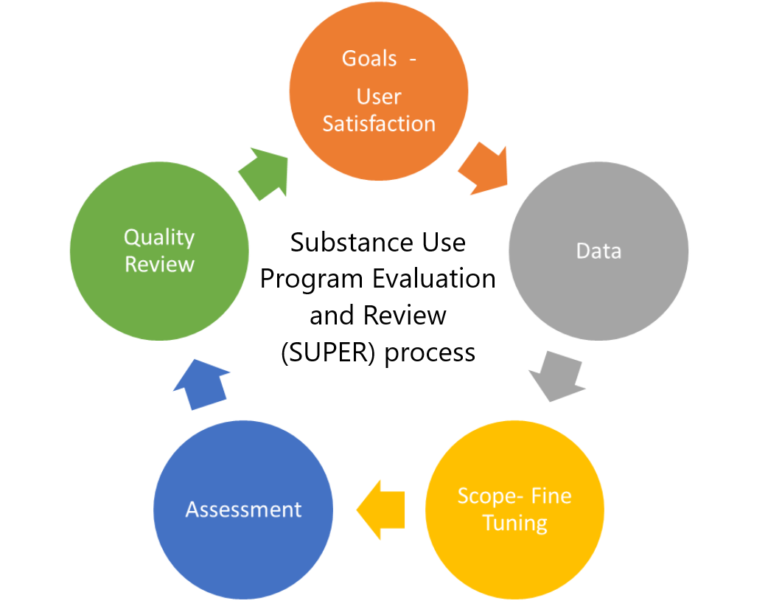RecoverMe-Large Language Model (LLM)
The innovative “RecoverMe” service is managed as a Large Language Model (LLM) with data collected through a number of resources such as Artificial Intelligence (AI) tools, SEO platforms like the Audienti (Audienti.com) solution with cutting-edge Search Engine and AI enhanced data filtration, basic research, model analytics and our team’s exceptional healthcare experience.
These tools and expertise combine to bring large scale resources to our clients at economical terms to gain deeper insights into their challenges (mission barriers), as well as defining preferences and treatment outcomes as goals for an effective recovery.
We help our clients turn challenges into goals and measures of success for their operation through an effective program evaluation methodology we call SUPER (Substance Use Program Evaluation and Review).

SUPER Steps:
Step 1 – Collect the proper size and “context” of data for the project.
RecoverMe leverages our Large Language Model and Artificial Intelligence (AI) tool, other commercial research tools, partner support, and most importantly the careful consideration of experts to oversee the process to collect relevant and diverse data that fits a proper sample size. Our data is reviewed during the process to eliminate bias and is “trained” to fit the goals of the project.
Step 2 – The initial Scope of the project is reviewed periodically to ensure that the programs’ data analysis is fine tuned to avoid scope changes and potential misalignment with project goals.
Fine tuning at this stage is a formal change control process that outlines how changes to project scope will be requested, evaluated, and approved with full documentation.
Step 3 – The Assessment step of the process serves as a review of the chosen substance use assessment. We benchmark both the success and improvement needs of the client’s model. Documenting both these areas is critical to ensuring the overall project is on track to meet your needs.
This step also provides a chance to effectively communicate the short term assessment findings with stakeholders to help “train” the direction of the project.
Step 4 – Quality Review is the key step prior to meeting with the client. There are many actions taken within our Qualty Review, here are a few:
Our review includes a thorough quality assurance check of the studies findings, data, analysis, and presentation materials to identify errors, inconsistencies, or gaps in the work. We also verify the accuracy of the data and analysis to ensure that the data sources are reliable and that the overall analysis methods are sound.
Unique to the RecoverMe service and SUPER process steps is the gathering of feedback from colleagues or team members who are not directly involved in the project. We have found that such a process provides a valuable perspective in refining the final presentation. We complete this step only if the client approves.
Most importantly is our recommendation actionable and measureable? Can our client follow the recommendations given their current resources, and how quickly can our client expect to see the benefit of our proposal?
Examples of the projects that we support include:
- Funding and Resources: We help our clients ensure proper funding and resource levels to support vulnerable populations, adequate staff, and access to the latest, most effective evidence-based treatments.
- Education: We raise patient awareness through education of new clients on the availability of Medicaid funded Inpatient and Outpatient Services, Medications, Counseling and Therapy, Screening and Assessment, Prevention, Case Management, and other needed services and resources available in the local community.
- Promotion: Increase treatment promotion and patient acquisition within certain zip codes.
- Workforce Shortages: Build a strategy and plan to proactively address potential shortfalls in qualified healthcare professionals.
- Measuring Outcomes: Accurately measure the effectiveness of treatment programs and demonstrating positive outcomes to increase funding and accountability.
- Feedback: Better understand treatment success, maximize outcomes, and identify areas for clarification by improving understanding of the patient experience.
- Processes: Determine the proper SAMHSA guidelines to be incorporated into clients operation including but not limited to evidence-based practices or recommendations for Individualized Treatment Plans.
- Community Collaboration: Increasing collaboration with community organizations and resources to improve successful patient outcomes.
We believe strongly in our structured approach to helping our clients and look foward to working with you. Contact us to learn more about how we can support your healthcare organization.

